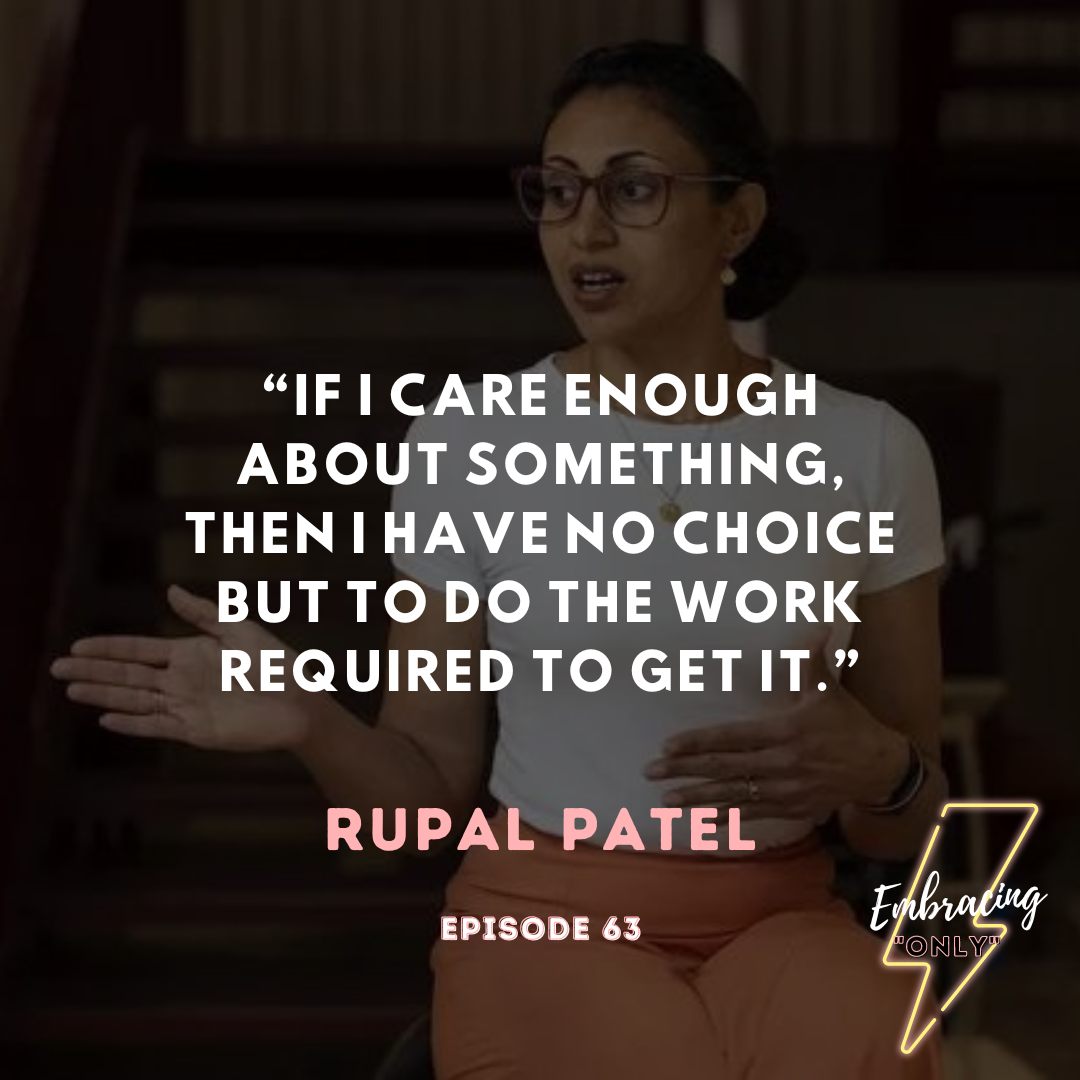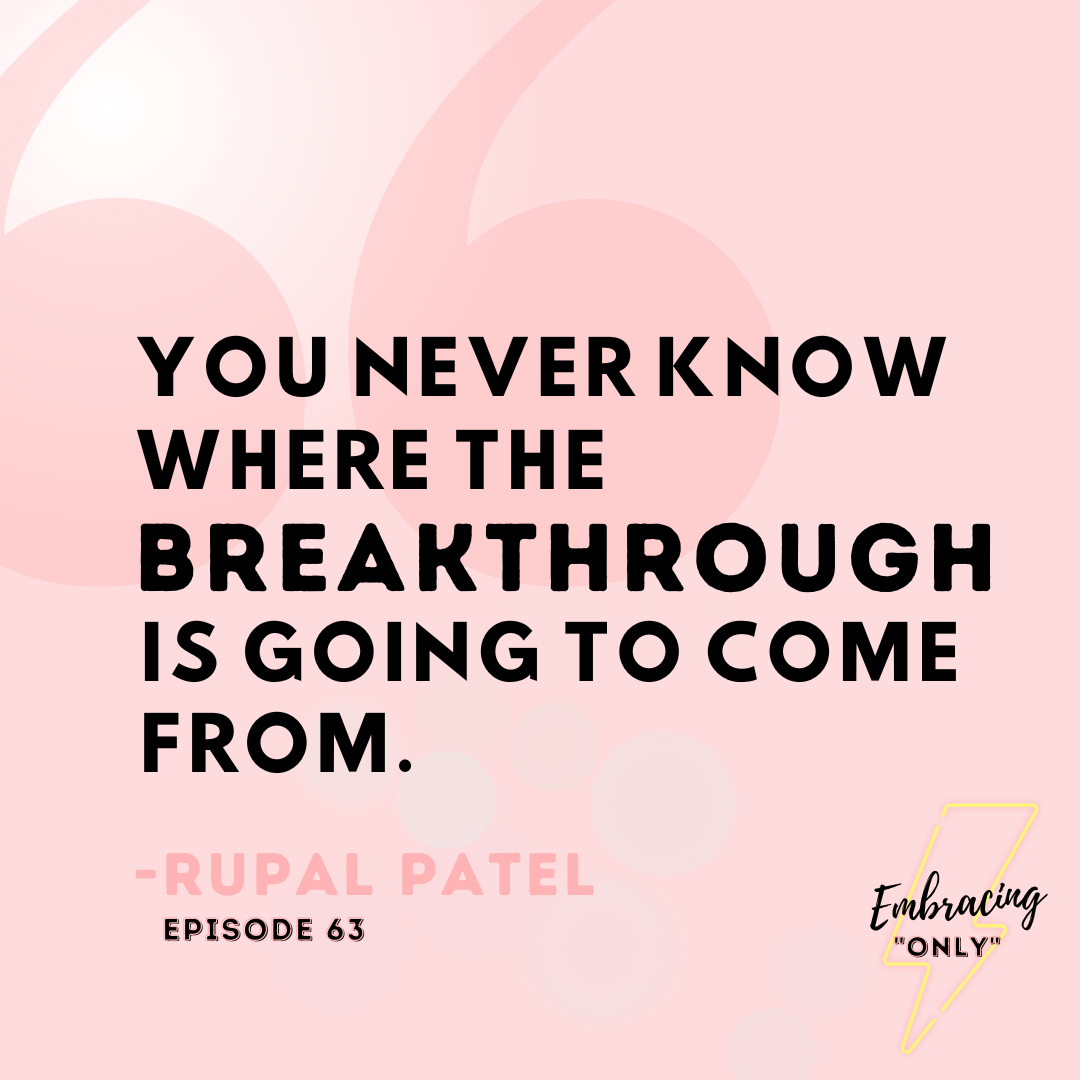Thriving in an Unpredictable World
In a world that often forces us to conform, Rupal Patel,’s journey of embracing her uniqueness stands out. Rupal shares her insights on owning your weirdness, finding your tribe, and embracing the uncertainties of life.
Listen to the episode or scroll down to read the blog post ↓
Rupal’s career is notably defined by her remarkable tenure at the CIA. Her service and dedication were recognized with warzone service medals and a prestigious commendation from the CIA director for her superior support to the President of the United States, highlighting her critical role in shaping national security decisions. She transitioned from her impactful career at the CIA and leveraged her insights and strategic acumen into the business world. And she has founded her first award winning business.
In this blog post, we’re covering the following:
Click here to listen on Apple Podcasts. While you're there, subscribe and leave us a rating and review if you enjoy the episodes.
1) Owning Your Weirdness
As a CIA agent, and as a CEO, Rupal has had to walk into many different rooms. In Rupal’s Ted Talk, she talks about her mom's sage advice. Be yourself. This ultimately empowered Rupal to own her weirdness.
Rupal shares that this was a conversation she had with her mom when she was a very self-conscious, very uncertain, and very introverted six year old who was desperate to be one of the cool kids.
“I always had a very vivid sense of my otherness.” - Rupal Patel
Rupal struggled with her mom’s advice. She struggled with the idea of being herself.
“This is true for many of us, maybe all of us, this idea that we wear many identities. Some of which are accepted more broadly, some of which are perhaps a little bit othered. And where we fit can be something that evolves and changes over time, especially from how we look at things.” - Rupal Patel
Rupal shares that embracing her weirdness has been a process and evolution. It’s not something that she just accepted one day.
“Some of it is genuinely just a process we all go through and you reach the other side sometimes just by virtue of having lived a little bit longer.” - Rupal Patel
Rupal explains that now that she is in her 40s, she has none of the baggage that she carried for the first few decades of her life.
“I am incredibly comfortable in my skin. I've found my voice. I'm not afraid to use it. I don't have that overly burdensome sense of what are people thinking about me and do they like me.” - Rupal Patel
Some of that came with age, but Rupal also did genuine work and reflection to get to this point.
Rupal explains that there is a real power in embracing and acknowledging the benefits of being the only in the rooms that you're in
Sometimes we get wrapped up in all of the noise of:
It's such a burden
It's so exhausting
I'm seen as a representative of my entire demographic.
“All of that stuff is true to some extent and we can change it, but it is also a real position of power being a bit weird, being an outlier, having a different perspective. Wherever that perspective comes from and whatever the source of that is, is a power.” - Rupal Patel
Rupal explains that we need to start leveraging that power in a meaningful and tangible way in our ambitions, our relationships, and our careers.
2) Advice for Women Struggling to Fit In
If you are a younger reader and are still in the thick of it, feeling like you don’t fit in or don’t see anybody who looks like you, Rupal has some advice for you.
“First and foremost, you get what you're looking for.” - Rupal Patel
Rupal explains that so often we come into situations with a selection bias. We think there is going to be no one who looks like us and we find endless data points to support that narrative.
“If you go into a certain context thinking I belong here and I am like the others here, it may not be obvious just yet how I am similar or why I do belong or how I do fit, but I'm willing to at least look for the data that supports that hypothesis.” - Rupal Patel
Rupal shares an extreme example of when she served out in the war zones and spent a lot of time with the security contractors. Superficially they had nothing in common. Rupal refers to herself as a nerd who loves getting degrees and was there as an analyst, not for her muscles. Whereas the security contractors appear to be the opposite. They’re the protectors.
“Then you have conversations. And you realize that there are shared ambitions or shared insecurities or just shared outlooks on life. It's not always going to be the case, of course, but the reality is, if you are willing to look for the data, engage with other human beings, you can look for similar things.” - Rupal Patel
Everybody is weird in some way.
“We're all trying to figure out how we fit and we're so, so focused on ourselves that it's hard to get the perspective that actually other people are going through that same process because superficially they seem like they belong and they fit.” - Rupal Patel
Rupal explains that all these things that we project on others are so often just that…
They're just projections.
Projections of our own insecurities or our own biases.
“You can find commonality in any context.” - Rupal Patel
Rupal encourages us to look for examples of where we do fit in because we will find them.
“You have to make a bit of an effort. You have to be willing to challenge your own insecurities and challenge your own assumptions about yourself and your assumptions about other people.” - Rupal Patel
This is true even with people whom you think you vehemently disagree with, it might not be that you want to hang out with them all the time, but you will find commonalities if you're willing to look for them.
This rolls over into the context of the workplace too.
“You're not going to 100% relate with or resonate with every single person. That's just life. But you will find your people. You will find your tribe if you are willing to look, and they won't look like what you might expect.” - Rupal Patel
3) Committing to the Process, Not the Outcome
Rupal is a prolific writer and there is a quote from one of her blog posts that I would love to share.
“Commit to the process and not the outcome. Get comfortable with the repetition, the tedium, and the trade-offs.” - Rupal Patel
This is something that is so hard for action-oriented people to do.
Rupal explains that you actually don't know if the repetition and the tedium will pay off. You hope it does.
“Part of the challenge is not just committing to a process, but committing to the right process and being willing to tweak and course correct along the way if required.” - Rupal Patel
But we have no other choice, right?
“If I care enough about something, then I have no choice but to do the work required to get it.” - Rupal Patel
If you want to achieve something, you have to commit to doing the things that you don’t always want to do, which can be boring and tedious. If you don’t, the chances of having the result you want are zero.
You have improved your chances, but there is still no guarantee of anything because there are so many things outside of our control.
Rupal explains that she almost takes a zen approach to her effort.
“I will do what I think will lead to the outcome, not get so obsessed over the outcome that I lose patience and then just stop it when results aren't happening fast enough.” - Rupal Patel
We have to let go of the idea of quick wins and overnight successes. That’s not how it works.
“You can never guarantee results, but you can give yourself the best chance of getting there.” - Rupal Patel
You need to be honest with yourself about what you're willing to give up in order to get the thing that you want to get because it's not going to be easy.
“All of the people that we admire [...] we were not there behind the scenes for the grueling and soul destroying setbacks that they had.” - Rupal Patel
The other thing is the time it takes to achieve your goals.
Who cares how long it takes?
“If the goal, or the vision, or the ambition is big enough, it genuinely doesn't matter if it takes two years or if it takes 20 years. If it's important to you, the time it takes shouldn't matter because that time is going to pass anyway.” - Rupal Patel
Rupal explains that either you fill your time with pursuing your dreams, obstacles and challenges included, or you decide it's not worth it and give up. It’s that simple.
4) Moving Through Fear
In the CIA, Rupal had to deal with real fear. There was a chance of bodily harm and potentially death. But in the civilian space, we also get crippled by fear sometimes. Rupal shares some advice for moving through fear.
“I have a tendency to catastrophize, right? It's not just, it'll be bad. It'll be a disaster. [...] We go to crazy places because some of us are highly intense.” - Rupal Patel
What has helped Rupal is instead of worrying about an ambiguous, theoretical outcome, she writes down specifically what she is worried about.
Once she has made this fear concrete and specific, she writes down what she can do about it.
For example, if her fear is going to a new place where she doesn't know anyone and is unsure if her message will resonate, what can she do to prevent that from happening?
She can do her research
Find out who is going to be there,
Talk to people who have been in that space before.
“In our minds, [...] we make things a lot worse than they end up being.” - Rupal Patel
To short-circuit that process, make it concrete and physically get it out of your head. Be very specific about what your fear is.
“The rest of that energy that previously would have been wasted, spinning yourself into a [...] tizzy in your own mind, channel that towards finding solutions.” - Rupal Patel
You need to focus on what you can control rather than everything that is outside of your control.
5) The “Let’s See” Approach
Rupal embraces what she called the “let’s see” approach.
She explains that we have an obsession with cause and effect.
If I do X, then Y will happen.
“We can get so obsessed over knowing what the outcome is, the predictability, the certainty, that we forget that very little in life is certain.” - Rupal Patel
You have to be willing to see what happens.
“Be a bit lighter and a bit more experimental in your approach to things because you never know where the breakthrough is going to come from.” - Rupal Patel
Rupal explains that you should know your ambition and your vision, but be more open to the process of getting there.
“Life is genuinely an experiment.” - Rupal Patel
Rupal explains that if you are listening to this podcast or reading this blog post, you are probably a resourceful person who wants to learn and grow. Take the risks, and if they don’t work out, you will be able to make another plan and grow in a different direction.
There is joy in the unknown.
“That satisfaction that comes from not knowing what's going to happen, but doing your best to try to go to where you want to go, of trying things that you wouldn't have otherwise tried, of pushing yourself outside of your limits.” - Rupal Patel
Rupal highlights that we overburden ourselves with the baggage and noise that we're given by society, from families, from certain cultures and backgrounds.
“Whenever you hear yourself saying, I should do something. My first response to that is to question where the should comes from. We are all products of family, school systems, societies, cultures, maybe religions, whatever it looks like, that give us these rules.” - Rupal Patel
If that rule resonates with you, keep it. If it doesn’t, let it go.
“Once you unpack where those shoulds come from, you might surprise yourself and find that a lot of the shoulds come from other people and other sources and are not aligned with your values, or your goals, or your ambitions.” - Rupal Patel
Rupal shares this great statement with us that a friend of hers uses:
“Stop shoulding all over yourself.”
We refer to this “should syndrome’ as giving away your power. Rather, figure out what works for you, and don’t let anyone else define what your success looks like.
To hear the full conversation, scroll all the way up and tune into episode 63.
About The Hosts: Olivia And Archita
OLIVIA
Olivia Grant Cream is the host and producer of the Embracing Only podcast. Nothing makes her happier than providing a platform to women who are changing the world.
Olivia is a proud US Veteran and HR Leader who is passionate about changing the face of corporate America by helping underrepresented people reclaim their power and live the life of their dreams.
She is an advocate for transitioning military members seeking second careers in the corporate landscape.
Olivia is a proud Jamaican and enjoys mentoring, coaching, classic cars, and nature. way you tell your story online can make all the difference.
→ You can work with Olivia here: www.oliviacream.com
→ Book her as a keynote speaker or moderator for your next ERG or company event.
ARCHITA
Archita Sivakumar Fritz is the Host and Producer of the Embracing Only podcast. Archita is an international executive, who has lived and worked in India, the U.S., Canada, and Germany.
She is the founder, principal of Ready Set Bold a workplace transformation firm that supports F500 to startups on their product, people and process transformation journey.
She is a fierce advocate for canceling the culture around the silence of bullying and harassment in the workplace through her work with Speak Out Revolution. She lives in Dusseldorf, Germany with her husband where they are raising their three third-culture kids.
→ If you want to work with Archita you can reach out to her here: www.readysetbold.com.
→ Book her as a speaker, moderator, or coach for your next company event or workshop.




